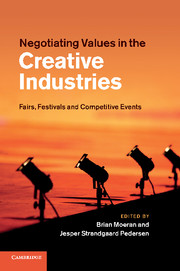Book contents
- Frontmatter
- Contents
- Figures
- Tables
- Contributors
- Acknowledgements
- Introduction
- 1 A Salon’s life
- 2 Art fairs
- 3 Biennalization and its discontents
- 4 Staging auctions
- 5 The book fair as a tournament of values
- 6 Inventing universal television
- 7 Transforming film product identities
- 8 Event institutionalization and maintenance
- 9 Tradition and transformation at the Fan Fair festival
- 10 Between art and commerce
- 11 Configuring sustainability at fashion week
- 12 An inconvenient truce
- 13 The retrospective use of tournament rituals in field configuration
- Afterword Converting values into other values
- Author index
- Subject index
- References
Afterword - Converting values into other values
fairs and festivals as resource valuation and trading events
Published online by Cambridge University Press: 25 October 2011
- Frontmatter
- Contents
- Figures
- Tables
- Contributors
- Acknowledgements
- Introduction
- 1 A Salon’s life
- 2 Art fairs
- 3 Biennalization and its discontents
- 4 Staging auctions
- 5 The book fair as a tournament of values
- 6 Inventing universal television
- 7 Transforming film product identities
- 8 Event institutionalization and maintenance
- 9 Tradition and transformation at the Fan Fair festival
- 10 Between art and commerce
- 11 Configuring sustainability at fashion week
- 12 An inconvenient truce
- 13 The retrospective use of tournament rituals in field configuration
- Afterword Converting values into other values
- Author index
- Subject index
- References
Summary
This rich collection of papers on fairs and festivals is a theoretical and empirical exploration of institutions that have thus far been largely ignored by social scientists. They are ignored because their economic role is generally seen as peripheral, and they are ignored because their internal processes, not to mention their relationship to the field in which they are situated, are variously classified as ‘field-configuring events’ (FCEs) (Lampel and Meyer, 2008), ‘tournaments of values’ (Moeran, 2010), ‘tournament rituals’ (Anand, Chapter 13; Anand and Watson, 2004) or ‘temporary clusters’ (Maskell et al., 2006; Bathelt, and Schuldt, 2008).
A natural response to this state of affairs would be to formulate a definition that stipulates what is meant by ‘fairs’ and ‘festivals’. But this, as the diversity of views in this book show, would be difficult, and would, in any case, divert attention from what is truly important about fairs and festivals: fairs and festivals are sites where social, economic and ideological processes, situated predominately in specialized contexts, interact openly and explicitly. In fairs and festivals the full range of economic, social and symbolic resources are in play; contexts where we can observe economic, social and symbolic resources being valued and converted into each other more directly than in other institutions such as markets or firms where this conversion is indirect or illegitimate.
Information
- Type
- Chapter
- Information
- Negotiating Values in the Creative IndustriesFairs, Festivals and Competitive Events, pp. 334 - 347Publisher: Cambridge University PressPrint publication year: 2011
References
Accessibility standard: Unknown
Why this information is here
This section outlines the accessibility features of this content - including support for screen readers, full keyboard navigation and high-contrast display options. This may not be relevant for you.Accessibility Information
- 19
- Cited by
